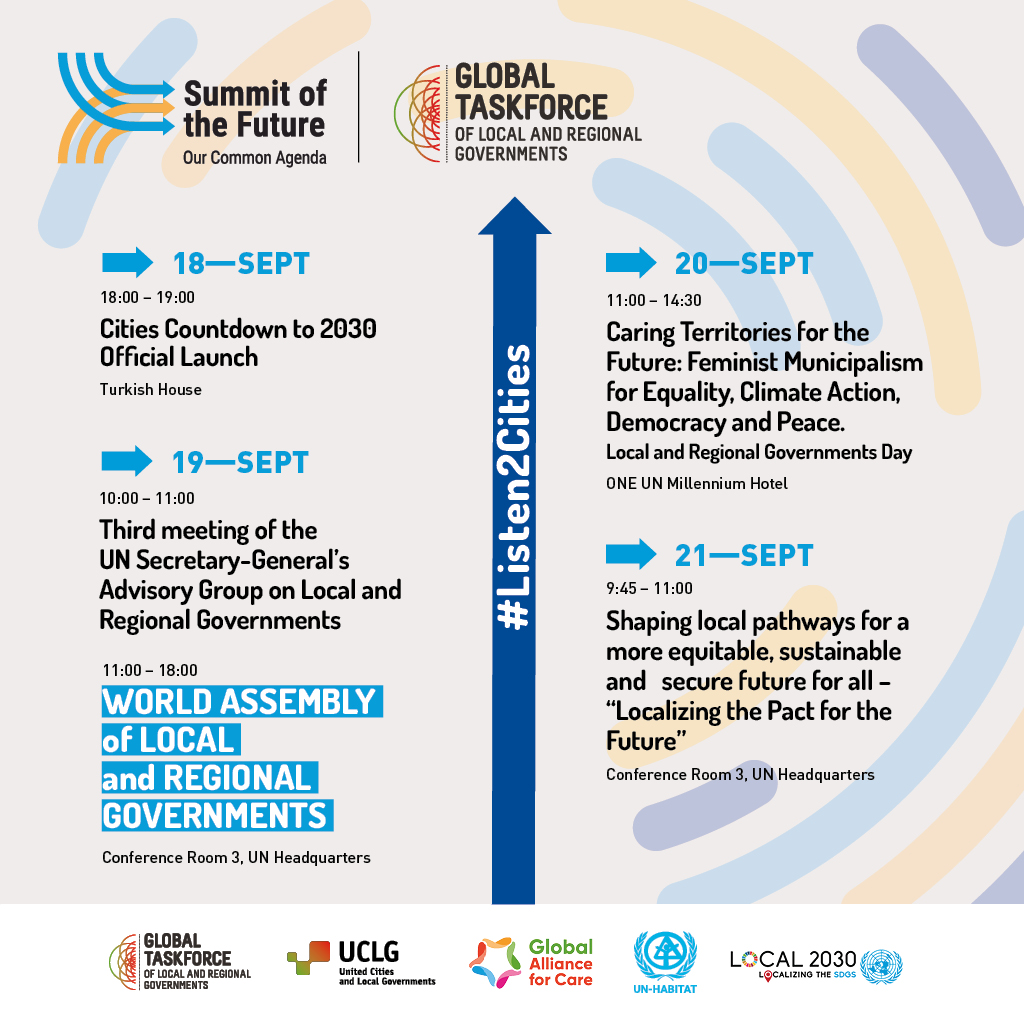
On Thursday 19 September 2024, on the premises of the UN headquarters, the World Assembly of Local and Regional Governments will come together facilitated by the Global Taskforce of LRGs during a full day of discussions to reaffirm their active commitment towards the localisation of Our Common Agenda, ahead of the United Nations 2024 Summit of the Future to be celebrated in New York from 21-22 September 2024.
A delegation of over 100 local and regional leaders will be present at the Summit of the Future, with cities such as Rabat, Kitchener, Utrecht, Montevideo Malmö, Konya, Amman, Paris, Belize, Banjul and regions such as Pichincha, Nouakchott and Kisumu being a part of the World Assembly. Partners from the United Nations, including the Deputy Secretary-General Amina Mohamed, agencies such as UN-Habitat, and regional commissions such as UNECE, and partners from the International Parliamentary Union, as well as national governments, will join the World Assembly.
The World Assembly of Local and Regional Governments within the Summit of the Future will go beyond its role in the follow-up and review of the New Urban Agenda, sending a clear message to the international system: We either break through, or we break out. The World Assembly, then, will be the space to call for the acknowledgment of local and regional governments as distinct political actors within the UN system, separate from other stakeholders, is crucial for the new multilateralism of the 21st century.
The World Assembly of Local and Regional Governments will be the space to publish a Statement from the organized constituency, calling on the General Assembly for the explicit inclusion and recognition of local and regional governments within the Pact for the Future of the United Nations, to ensure that the voices are lives of communities are accounted for in global decision-making.
Earlier on 19 September, ahead of the start of the session of the World Assembly of Local and Regional Governments, the UN Secretary-General's Advisory Group's on Local and Regional Governments will be holding their third and final meeting with the UN Secretary General to present their global strategy to the Secretary-General, which will contain an action plan for enhanced local and regional governments engagement in UN processes to deliver and localize Our Common Agenda.
The Advisory Group is composed of 20 members, including 15 local and regional government representatives that were nominated by the Global Taskforce, and five representatives from national governments. The Group is co-chaired by the President of the Nouakchott region and the State Secretary for Migration of Spain, and the discussions are supported by the United Nations System under the facilitation of the secretariat by UN-Habitat with the support of United Cities and Local Governments.
The third and last meeting of the UN Secretary-General with his Advisory Group is expected to lay out concrete steps for advancing this agenda during and beyond the Summit of the Future, with a view to active engagement through 2030 and at future major UN conferences. Local and regional governments, as guardians of public trust, play a crucial role in ensuring equality and resilience through public services and social protection. Our structural integration into global decision-making processes is essential to achieving transformative change, which requires that we have the global recognition and space to contribute with a specific status in decision-making forums.
On 20 September, a side session entitled “Caring Territories for the Future: Feminist Municipalism for Equality, Climate Action, Democracy and Peace. Local and Regional Governments Day” will be organised by UCLG in partnership with the Global Alliance for Care, UN Women and the Government of Mexico, and with the support of Generation Equality Forum Action Coalition on Feminist Movements and Leadership at the Millenium Hilton New York One Un Plaza.
Spaces for engagement of the constituency at the Summit
Throughout the Summit, the sessions will contribute to actionable strategies within local and regional competencies, across the Action Day themes relating to digital, peaceful, and sustainable futures. Together, elected officials, high-level representatives and global partners will discuss the main priorities agreed by Local and Regional Governments, and share ways to boost collaboration between the UN and Local Governments and to enhance a seat at the global table.
In the framework of the Summit of the Future, the delegation of local and regional governments will be represented throughout the Future Action Days and other spaces.
On 21 September, the session “Shaping local pathways for a more equitable, sustainable and secure future for all – ‘Localizing the Pact for the Future’” will be led by the Local2030 Coalition, the Global Taskforce of Local and Regional Governments, as well as the national governments of Brazil and Spain. The session will build on the objective of the Summit to forge “a new global consensus” on the future of multilateralism by illustrating the power of multistakeholder collaboration and multilevel governance to achieve the promise of the Pact for the Future and Our Common Agenda at the local level.
The Cities Countdown to 2030 initiative will be launched in the Turkish House in New York on 18 September 2024. Through powerful alliances with international organizations, civil society, academia, and other stakeholders, this platform aims to accelerate the 2030 Agenda and create a sustainable future for all, ensuring that global goals translate into tangible, impactful actions at the local level.
The Summit of the Future is understood by the constituency of local and regional government not as the culmination of our strategy towards a renewed multilateral system, but as the starting point to accelerate the delivery of the sustainable development goals. Our constituency remains committed to showing the world that real change starts from the ground up—from the neighborhoods, the communities, and the cities where people live, work, and dream, and hopeful that the deliberations of the Summit will enable us to unlock our potential to transform the world.
